For centuries, Atlantis has been a fascination, driving a relentless search for this mythical lost city. Recently, the Netflix series “Ancient Apocalypse” topped viewing charts in both America and Europe. This underscores how the story of Atlantis captivates us still, from the days of Plato’s dialogues to today’s modern interests. It beckons us to explore the depths of ancient civilizations, seeking the truth beneath the waves.
Our journey begins by delving into the mysteries of Atlantis. We aim to understand its origins and its profound influence on our historical perceptions. Exploring underwater ruins and examining philosophical thoughts, we are drawn into the enduring puzzle of Atlantis. It captivates and dares us to challenge our traditional views on the past.
Oceanic Legends: The Mythos of Atlantis
The tale of Atlantis has intrigued people for over 2,300 years. This lost island civilization, mentioned by Plato about 9,000 years before his time, symbolizes a forgotten era. It highlights the lasting appeal of Atlantis origin myths.
Plato’s Dialogues: Unraveling the Origins
Plato’s dialogues “Timaeus” and “Critias” offer the earliest, detailed accounts of Plato’s accounts of Atlantis. In these accounts, he described an advanced, technologically superior society. This society met its end in a cataclysm, vanishing beneath the ocean. Plato’s detailed accounts have sparked endless debates and studies on Atlantis’ existence and nature.
Cultural Interpretations: A Global Phenomenon
Far from being merely an idea, the global Atlantis legends have gripped various cultures across the ages. Ranging from ancient Greek and Roman tales to modern artistic and literary creations, the Atlantis narrative underpins ideas of human possibility, ethical downfall, and the vulnerability of sophisticated societies. Its allure stems from its power to both fascinate and challenge our views on history.
“Atlantis was larger than Libya and Asia combined, and was the way to other islands, and from these you might pass to the whole of the opposite continent which surrounded the true ocean.” – Plato, Critias
Archaeological Expeditions: Pursuing the Lost City
The search for Atlantis has gripped the minds of many for countless ages. Although the city’s reality remains a mystery, the hunt for it has unveiled myriad fascinating finds. These discoveries range from sunken ruins to ancient literature, each adding a layer to the Atlantis narrative. They inspire ongoing exploration and widen our knowledge.
Underwater Ruins: Tantalizing Clues
Discovering sunken remnants of Atlantis stands as a key enigma. Explorers have ventured deep into the sea, hoping to uncover its lost buildings and artifacts. Thanks to modern advances in undersea archaeology, like satellite technology and LIDAR, we’ve glimpsed intricate formations below. The recent unearthing of geoglyphs in the Amazon and Gran Pajatén’s intact structures in Peru underline the potential for surprising finds.
Ancient Texts: Decoding the Mysteries
Reading the historical and literary legacy of Atlantis has been another fruitful approach. With works stretching from Plato’s dialogues to the Manuscript 512 at Brazil’s National Library, these ancient accounts offer rich details. Decoding these writings may offer fresh perspectives on Atlantis’ history, culture, and possible fall. 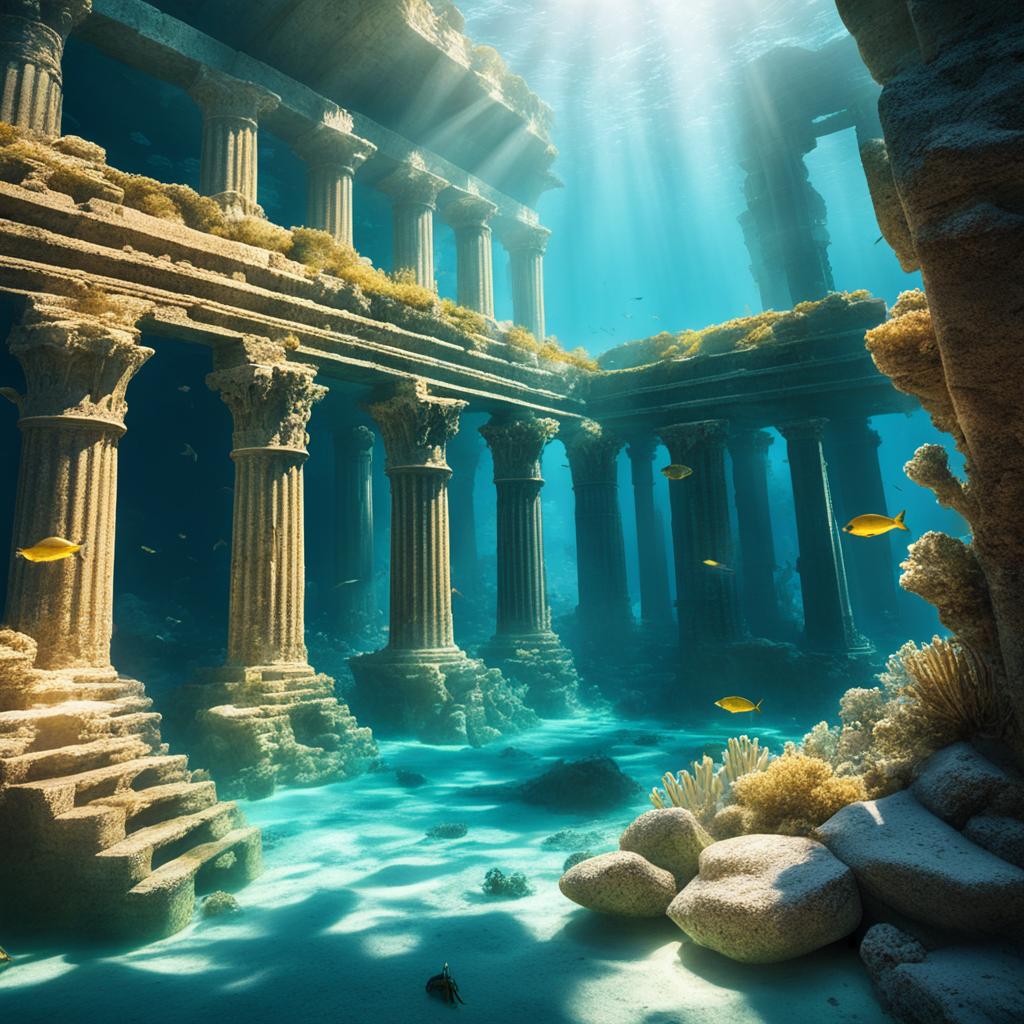

Through a blend of underwater exploration and literary analysis, the mystery of Atlantis remains vibrant. These combined efforts fuel a cycle of renewed interest, furthering our pursuit of knowledge. The puzzle pieces discovered so far reinforce Atlantis’s enduring appeal, urging us to continue our quest.
The Realm of Ancient Civilizations
A tapestry of ancient civilizations, rich in ingenuity, stands as a testament to human advancement. Mesopotamia introduced us to advanced irrigation and formidable city-states. Meanwhile, the Indus Valley Civilization showcased well-planned cities and advanced sewage systems. These feats have heavily influenced the path of human development.
Atlantis and the Cradle of Humanity
Delving into the mythos of Atlantis, we find a lost world deeply linked to our ancestral beginnings. Plato’s writings propose that Atlantis, with its advanced tech, influenced the ancient civilizations from which we trace our roots. This impact is evident in the architectural wonders of Egypt and the philosophical enlightenment of Greece. Atlantis serves as a vanished epitome of our potential, a cautionary tale against hubris and natural forces.
“Atlantis was not merely a physical place, but a metaphor for humanity’s potential – a lost world that represented our ability to create extraordinary civilizations, only to have them succumb to our own hubris and the forces of nature.”
Lost Knowledge and Advanced Technology
What captivates us about Atlantis is its speculated grandeur and the unverified Atlantis technology. The discovery of the Antikythera mechanism hints at ancient engineering prowess. It appears in stark contrast to the simpler technologies typically associated with the time. Babylonians, with their eclipse predictions, and the Greeks, with their Earth’s circumference calculations, show a deep-rooted scientific understanding ahead of their time.
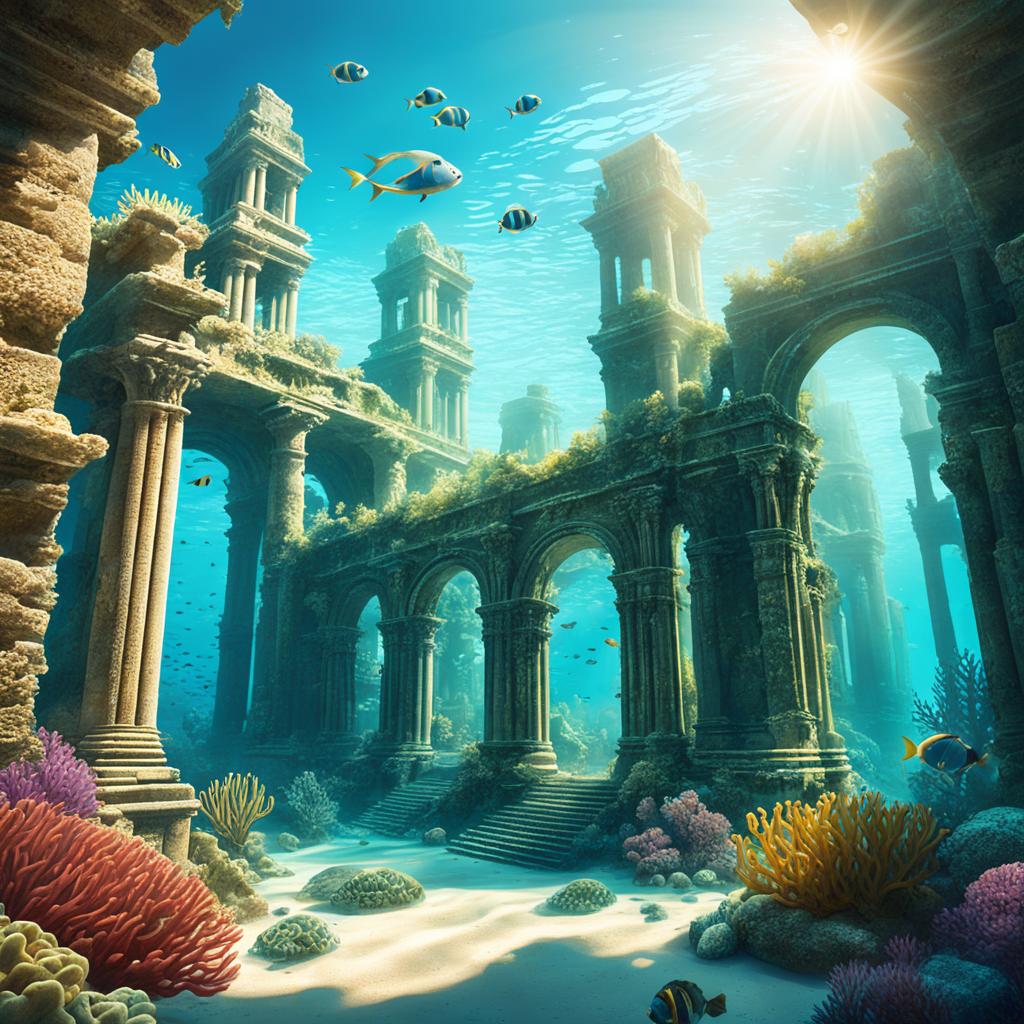

Unveiling the past’s mysteries, including Atlantis and its lost knowledge and advanced technology, could enlighten us on our potential. This journey sheds light on our endless quest for progress and human triumph.
Philosophical Musings: Atlantis as Metaphor
For centuries, Atlantis has fascinated us, blending lost history with profound thought. Plato’s works, including “Timaeus” and “Critias,” painted Atlantis as a metaphor. It pushes us to examine the lifecycles of societies, the impact of our choices, and how even the most powerful can fail.
Plato described Atlantis as a naval giant, existing 9,000 years before him. Its quick, total destruction, vanished in a day and night, highlights the fragility of human achievements. This story warns of the dangers from arrogance and moral decay.
Utopian Ideals and Human Potential
Atlantis, more than a tale, sparked discussions on perfect societies and human ability. Plato envisioned it as a highly advanced, peaceful land. This vision challenges us to pursue a reality where knowledge and goodness lead our society’s development.
“Atlantis represents the eternal human dream of a perfect society, a world of justice, harmony, and prosperity, only to be inevitably shattered by the flaws and weaknesses inherent in the human condition.”
The fall of Atlantis warns us about complacency, reminding us to guard against greed and arrogance. It calls for an examination of our societal foundations and our connection with nature. This reflection is crucial to avoid the fate of Atlantis.
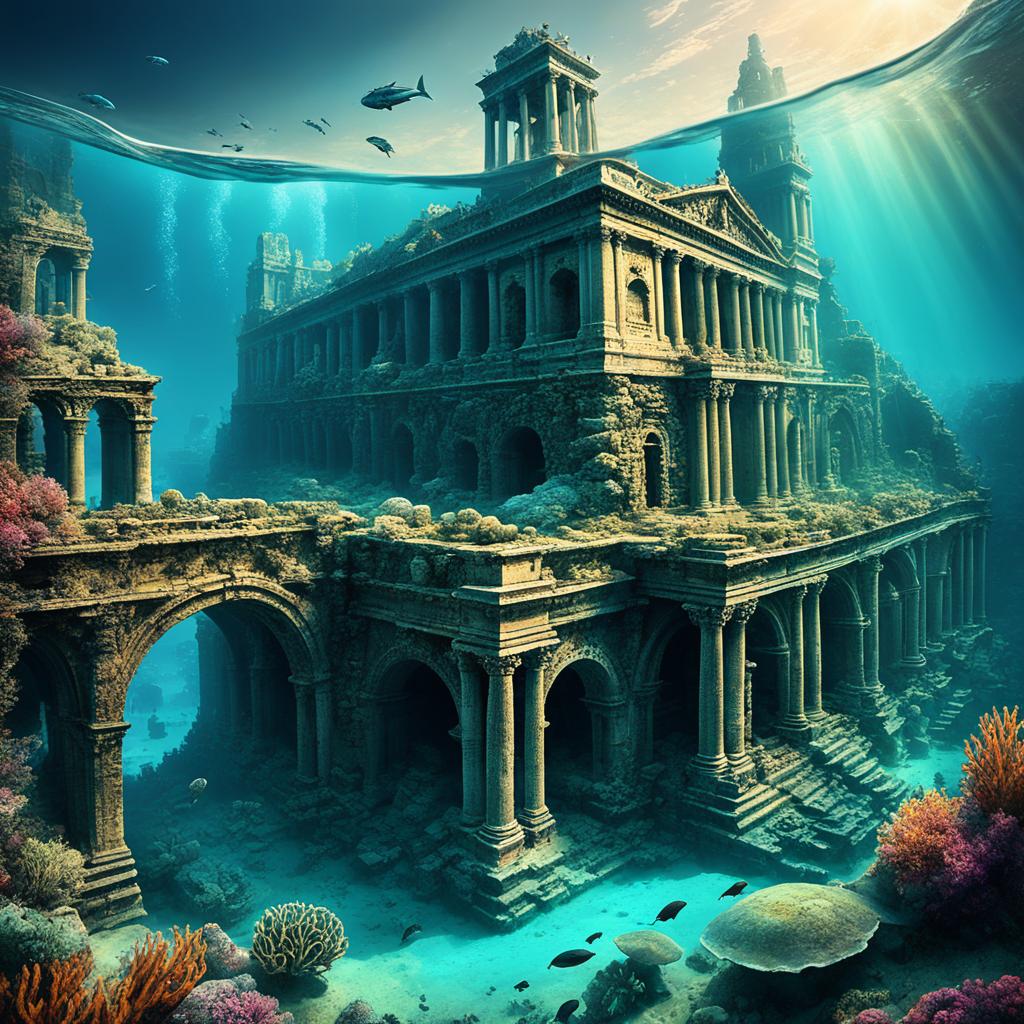

Considering Atlantis, we face our dual nature – capable of grand success yet prone to ruin. It invites us to aspire for a better, sustainable future. Ambition for harmony and enduring creation is the essence of learning from Atlantis.
Modern Interpretations: Reimagining Atlantis
Over two millennia ago, ancient Greek philosopher Plato shared the story of Atlantis. This tale still captivates us today. Plato’s works, “Timaeus” and “Critias,” outlined the lost civilization. The passing centuries, however, have birthed numerous modern Atlantis theories, sparking debates over its nature and demise.
In 1882, Ignatius Lu Donnelly published “Atlantis: The Antediluvian World,” triggering renewed interest in the mythical city. Since then, numerous theories have emerged on both scientific and imaginative fronts. Whether linking Atlantis to real archaeological finds or exploring it in fiction and cinema, the myth provides a rich tapestry. It reflects our collective yearnings, fears, and dreams.
“Atlantis has become a metaphor for the human condition – a symbol of the triumph and tragedy of civilization, a mirror to our own fears and hopes for the future.”
Various theories place Atlantis anywhere from the Atlantic Ocean to Antarctica. Despite extensive research, no hard evidence of its existence has been found. Nevertheless, the mystery of Atlantis endures, offering new insights into our societal issues. It invites us to ponder how we can create a better, more sustainable future.
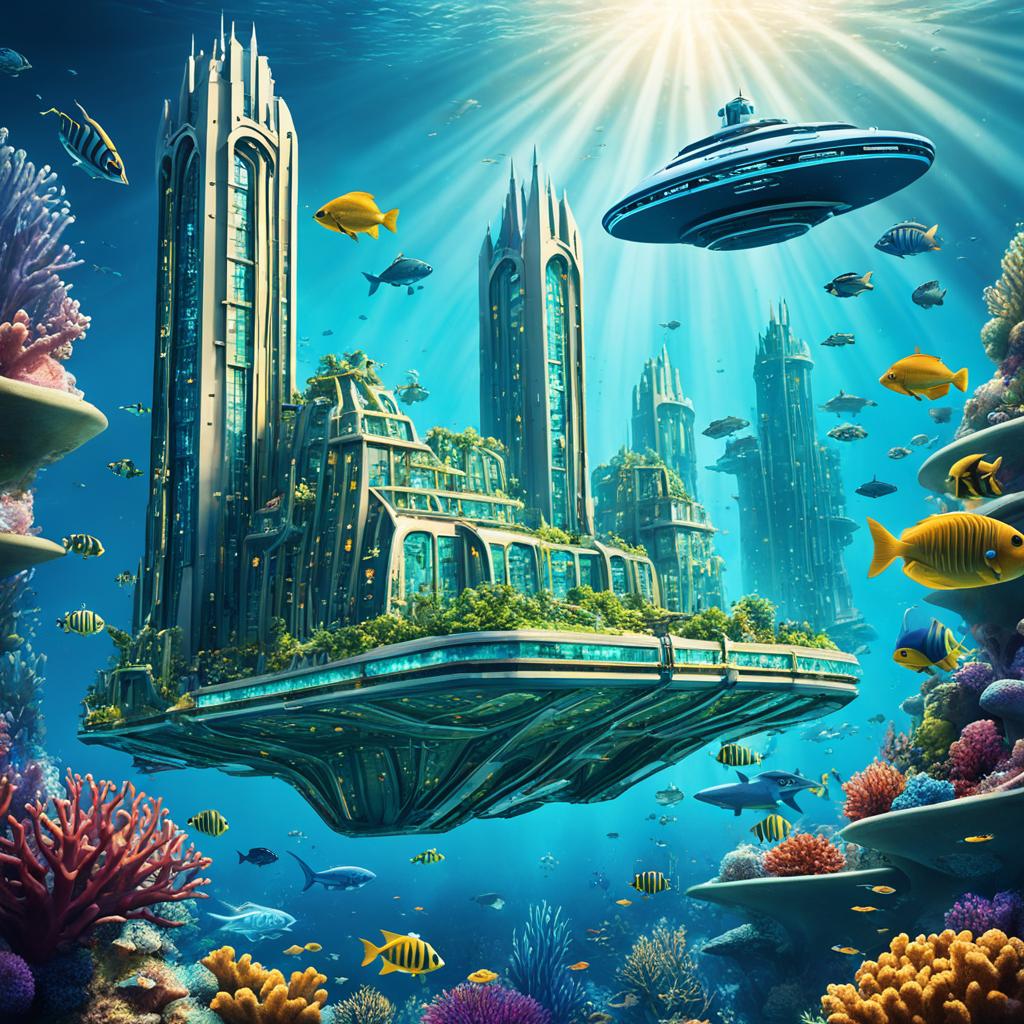

The legend of Atlantis has evolved over time, reflecting shifting cultural values. From Hitler’s Nazis idealizing it as a symbol of racial purity to today’s search for ancient submerged cities, Atlantis remains relevant. Its fictional accounts and possible truths offer lessons in technology, environmentalism, and societal structure. These could guide us in reshaping our modern world for the better.
Artistic Inspirations: Atlantis in Pop Culture
The mythical lost city of Atlantis has captivated artists, authors, and storytellers throughout history. Originating in ancient Greek philosopher Plato’s dialogues, its influence spans from classic literature to contemporary blockbusters. This submerged civilization continues to stoke the fires of creative minds worldwide.
Literature, Film, and Beyond
Jules Verne introduced Atlantis in his legendary work, 20,000 Leagues Under The Sea (1869/71). Here, the main character explores the sunken city alongside Captain Nemo. Marion Zimmer Bradley’s Avalon Series intertwines the Atlantis saga with the ancient druids, highlighting the city’s linked fate with the mystical realm of Avalon.
Additionally, Edgar Rice Burroughs incorporated a lost city named Opar, seen in his Tarzan series, noting its connection to Atlantis. This element of Opar first emerged in The Return of Tarzan (1913). Pierre Benoit’s L’Atlantide (1919) tells the tale of two French officers who uncover the city within the Sahara and are mesmerized by its queen, Antinea. This narrative has inspired several film adaptations.
“Atlantis has long been a source of fascination, captivating the imagination of writers, filmmakers, and artists alike. Its enduring legacy continues to inspire new interpretations and explorations of this enigmatic lost civilization.” – LiveScience
More recent works have also featured Atlantis prominently. Eoin Colfer’s Artemis Fowl envisions a prosperous Atlantean society in its storyline, while Sherrilyn Kenyon’s Dark-Hunter series presents an Atlantean god as its protagonist. Through these modern stories, Atlantis’s allure endures, capturing the interest of yet more readers and viewers.
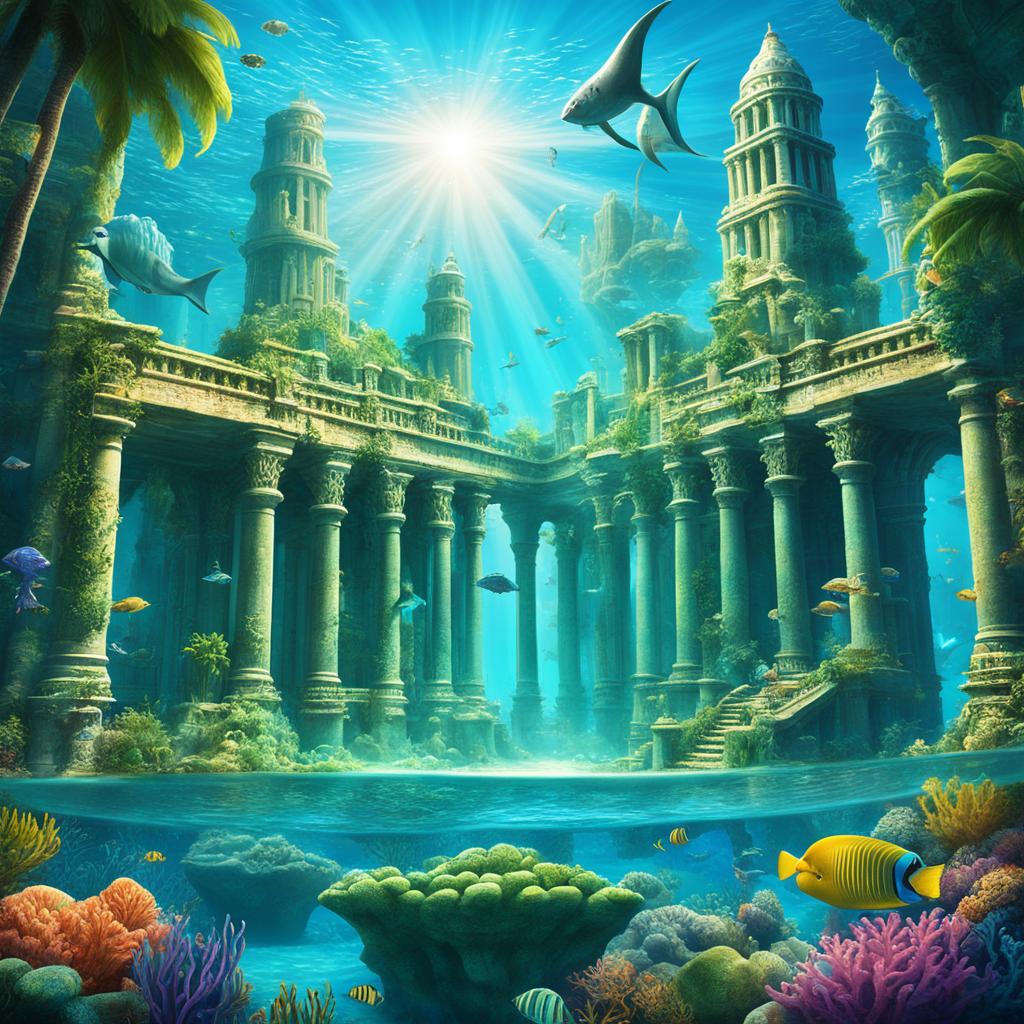

The myth of the lost city remains a fertile ground for creative expression, appearing in various genres from fantasy novels to blockbuster films. Whether symbolizing a forgotten time or showcasing the ocean’s deep mysteries, Atlantis continues to feed the imaginations of artists and writers globally.
Unsolved Enigmas: The Enduring Allure
The hunt for Atlantis has held us spellbound for ages. Despite all efforts and ideas, its secrets remain hidden. The vague clues and provoking puzzles make Atlantis even more intriguing, turning what we know on its head. This mystery keeps pulling in experts and fans to discuss and ponder over its existence.
Challenging Conventional Wisdom
Delving into Atlantis often takes us off the beaten path. It makes us reconsider what we assumed was true and question everything. Discoveries, such as the sunken Thonis-Heracleion in Egypt and Laos’ Plain of Jars, shake our views of ancient times. This quest has spurred many eye-opening finds, reshaping history as we know it. Atlantis unsolved mysteries keep us looking with new eyes at the past.
The Search Continues…
Problems and debates haven’t slowed the quest for Atlantis. People are still eager to uncover this ancient puzzle. Using advanced tools and studying old texts, they aim to shed light on this lost civilization. The ongoing Atlantis search remains a beacon for adventurers and researchers alike. It offers hope for understanding more about our past and perhaps changing the story of humanity.
“The search for Atlantis is not just a quest for a lost city, but a journey of self-discovery, challenging our preconceptions and inspiring us to explore the unknown.”
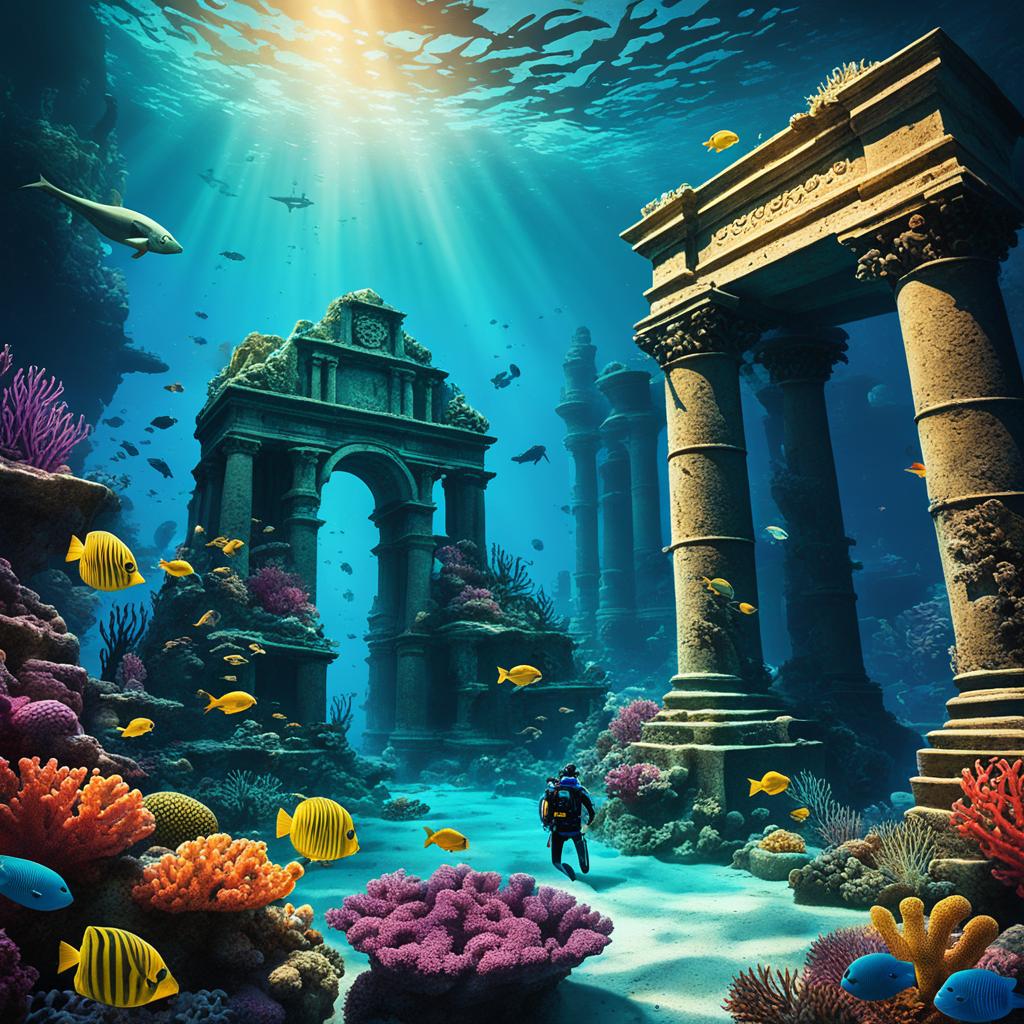

Cutting-Edge Technology: New Frontiers of Discovery
In the riveting journey to find the lost city of Atlantis, leading technology now changes the game in underwater archaeology. Today’s researchers are exploring new ends with the help of cutting-edge tools. These advancements pave the way for stunning discoveries.
The arsenal of modern archeologists includes top-notch scanners and imaging devices, alongside remote capabilities. These tools alter their expedition methods radically. Artificial intelligence (AI) stands at the forefront, scouring massive data to mark possible dig sites with extraordinary precision. AI’s use also streamlines excavation operations and rapidly categorizes unearthed items.
“AI is reshaping historical research by providing tools that enhance, accelerate, and deepen our understanding of the past,” notes Dr. Sarah Parcak, a renowned pioneer in the field of space archaeology.
Yet, the shift in archaeology tools isn’t confined to AI. LiDAR technology, coupled with AI, can revive ancient cities and landscapes, offering insight into the Atlantis enigma. Besides, virtual reality (VR) applications, backed by these technologies, let the public dive into underwater dig revelations.
As these new technology strides in underwater archeology evolve, the prospect of Atlantis’s discovery grows brighter. Every major breakthrough hints at the possible resolution of this age-old puzzle.
Environmental Implications: Lessons from a Lost World
Exploring the enigmatic story of Atlantis unveils more than just myths. It prompts us to reflect deeply on our impact on the world. The legend, if true, underlines the vital link between human progress and nature’s wellbeing. We’re urged to consider the lessons it offers for balancing development with care for our planet.
Plato’s accounts on Atlantis hint at reasons for its destruction. Many have debated its demise due to environmental neglect, including natural calamities and overuse of resources. Such discussions shed light on our own quest for sustainable life, linking past tragedies to present Atlantis environmental lessons, lost civilization, and sustainability debates.
“The story of Atlantis serves as a cautionary tale, reminding us of the consequences that can arise when a society becomes disconnected from the natural world and fails to prioritize environmental stewardship.”
Records and findings propose Atlantis as a sophisticated society living in balance with nature. But, it was their overconfidence and ignorance that led to their ruin. This scenario mirrors our current struggles against environmental degradation, including climate change and pollution.
Studying the possible environmental triggers behind Atlantis’s fall teaches us crucial sustainability principles. It underscores the need for mindful use of resources and the importance of respecting our ecosystems. The Atlantis story hints at a path for us, suggesting a more careful and cooperative stance towards nature.
The quest to understand Atlantis beckons us to work towards a sustainable world. Its tale, factual or not, warns us of the grave outcomes of disregarding our planet’s needs. Drawing lessons from this lost world, we are encouraged to reshape our future. We’re reminded to strive for a balance that ensures prosperity for both our species and Earth.
Conclusion: The Living Legacy of Atlantis
The mystery of Atlantis continues to grip the human imagination. It showcases our endless curiosity and quest to unearth the past’s secrets. Despite the debate over its existence, the myth of Atlantis captivates many, spurring a wealth of creative and intellectual work.
From Plato’s writings to current underwater expeditions, Atlantis’ intrigue remains strong. It mirrors our profound thirst for the undiscovered and urge to expand our knowledge. Whether it’s the alluring hints beneath the sea’s surface or speculations of advanced technology and otherworldly beginnings, Atlantis’ tale enchants the globe.
With each step into history and the use of modern tools, the hunt for Atlantis continues. Many believe solving this ancient mystery could open doors to understanding our past and future. Atlantis serves as an emblem of humanity’s ongoing pursuit of knowledge, showing that the most profound discoveries emerge while chasing the mysterious.
